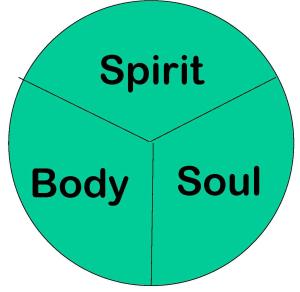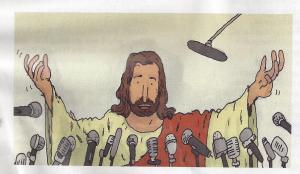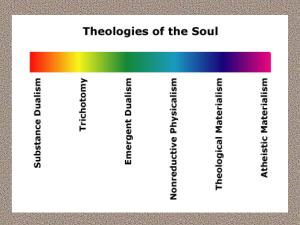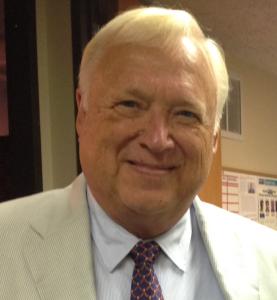Body, Soul, and Spirit

Body, soul, and spirit. Together they form a trichotomy. What’s a Trichotomony?
In the early centuries of the Christian era, trichotomists drew a picture of the human person as a whole person made up of body, soul, and spirit. The body is physical or corporeal, quite obviously. And the soul and spirit are incorporeal, to be sure. But, soul and body are not confused or conflated into a ‘spiritual soul’ as in substance dualism.
According to trichotomists, it is acceptable to identify the soul with the mind, with the individual mind that does the thinking. The spirit, on the other hand, makes possible a supra-physical unity or bond each individual can share with others, with the church, and with God. Soul and spirit are two dimensions of the incorporeal.
Each of us enters the world at birth with both a human soul and a human spirit. In baptism the human spirit is replaced by God’s Holy Spirit. It is in the dimension of spirit, not the soul, where the overlap between human life and the divine life initially take place. Of the various options on our spectrum, I like trichotomy the best.
Body, soul, and spirit in the Bible
One thing trichotomy has going for it is that it is biblical. In moments of emphasis, the New Testament refers to body, soul, and spirit.
“May the God of peace himself sanctify you entirely; and may your spirit and soul and body be kept sound and blameless at the coming of our Lord Jesus Christ” (1 Thessalonians 5:23).
“God is spirit” (John 4:24). So, with this in mind, notice how St. Paul connects our human spirit with God’s Holy Spirit.
“The Spirit himself bears withness with our spirit that we are children of God” (Romans 8:16).
Is this enough for us to abandon a simple body-soul dualism and reach for a trichotomy of body, soul, and spirit?
Might Jesus clarify matters for us?

Let’s ask whether Jesus had an opinion on the matter at hand. How might you interpret Matthew 22:37? Does Jesus tacitly distinguish between the mind and the soul?
“He said to him, ‘You shall love the Lord your God with all your heart, and with all your soul, and with all your mind’” (Matthew 22:37).
If the mind and soul are not the same thing, then what might this imply? I have already tried to make the point that the soul is the deepest center of the self or person, and this is more than merely the mind. But does it include the mind? This is getting messy.
Jesus does not help us clarify matters here. In fact, he further confuses us. When dying on the cross, Jesus commends his spirit (pneuma) to the father and gives up his spirit (John 19:29). Okay. That’s clear. Or is it? Earlier (John 10:15), when Jesus was talking about what he was going to do, he said he was giving up his life (psyche, soul) for his sheep. Perhaps God gets Jesus’ spirit, and we get his soul. Right?
Well, I hesitate to ask such passages to do our systematic theology for us. Jesus spoke Aramaic. And we’re reading in Greek what John said Jesus said. We should not expect Jesus to be preparing us to parse these things with philosophical precision. With a tad of messiness, I recommend we associate the spiritual dimension with our relation to God and our soul as constituting our centered self.
Dichotomy vs Trichotomy in the Bible and Systematic Theology

Some like to make a dichotomy out of the relation between substance dualism, on the one hand, and trichotomy, on the other. Let’s line up our Bible passages like sniper rifles and fire them at each other.
Firing from the dualism fox holes are Bible verses that use the terms soul and spirit interchangeably (Matthew 10:28; Luke 1:46–47; 1 Corinthians 5:3; 7:34). Firing from the trichotomy fox holes, here are passages that hint at the separation between the soul and spirit (Romans 8:16; 1 Thessalonians 5:23; Hebrews 4:12). Give special attention to the phrase–“divides soul from spirit” –in Hebrews 4:12.
“Indeed, the word of God is living and active, sharper than any two-edged sword, piercing until it divides soul from spirit, joints from marrow; it is able to judge the thoughts and intentions of the heart” (Hebrews 4:12).
So, which is it? Dualism or trichotomism? The Bible seems to march in two directions. Woe is me! How is a systematic theologian to decide?
Charles Hodge (1797-1878), one of the progenitors of the late 19th century Princeton Theology, shuns trichotomy like a cat shuns a lawn sprinkler.
“This doctrine of a threefold constitution of man being adopted by Plato, was introduced partially into the early Church, but soon came to be regarded as dangerous, if not heretical. It being held by the Gnostics that the πνεῦμα in man was a part of the divine essence, and incapable of sin; and by the Apollinarians that Christ had only a human σῶμα and ψυχή, but not a human πνεῦμα, the Church rejected the doctrine that the ψυχή and πνεῦμα were distinct substances, since upon it those heresies were founded.”
Marching with Hodge in the dichotomist infantry are renowned Dutch Calvinist scholar Louis Berkhof (1873-1957) and contemporary blogsites such as the Christian Research Institute, the Nordic Preacher, and Rey Renoso’s Bible Archives. In contrast, Patheos columnist Jack Wellman defends trichotomy.
Here’s a more ambiguous conclusion offered by Got Questions? Your Questions. Biblical Answers.
“Trichotomy vs. dichotomy of man—which view is correct? It would seem that it is unwise to be dogmatic. Both theories are biblically plausible. Neither interpretation is heretical.”
Despite what Hodge trumpeted, this discussion does not risk heresy. Now, do you feel better?
Body, soul, and spirit together make us whole

It seems to me that we need not substantialize body, soul and spirit. Rather than view them as three substances, suppose we view them as dimensions of a single reality, namely, the human person. The concept of dimension does not require sharp dividing lines.
So, I contend, without specifying precise demarcations for each, the terms body, soul, and spirit together constitute a whole human person, a beloved one of God.
As I mentioned above, trichotomy may be a bit messier than some of the other theologies of the soul. But, I think that referring to body, soul, and spirit as dimensions of the human person regains a satisfactory level of coherence.
Soul, Self, and Spirit

Now, as you can see, with trichotomy I am trying to nudge soul in the direction of identifying the centered self. In this sense the soul is individual. In the Psalms and elsewhere, the soul is what connects with us with God. ‘Say to my soul [O Lord], ‘I am your salvation!’” (Psalm 35:3). We connect with God at our deepest personal level.
It is important, I believe, to appreciate a certain dynamic. When God loves us, we become more fully a person. To be loved is to be enhanced as a person. When in Christian ethics we celebrate self-sacrifice, we are not hinting that the self disappears. Rather, we’re accentuating how important it is in Christian love to attend to the needs of the neighbor, the beloved. When you and I love with self-sacrificial love (agape) we do not dissolve our self. Rather, we become much more robustly defined as a self who loves. This happens both to God and to us when love governs our relationship.
Might we call this ‘soul growth’ or ‘soul enhancement’?
Here’s where it gets even messier. That connection we have with God is what the word ‘spirit’ points to. As I’ve said, I would like to use the term ‘spirit’ to refer to the relationship we have with others and with God. And I’d like the term ‘soul’ to refer to who we are in this relationship, even if our soul grows and gains greater self-definition due to our relationship with God.
Where have we been? Where are we going?
Here’s our graph depicting various Theologies of the Soul. It was prepared by my faculty colleague, Martinez Hewlett, now at University of New Mexico, Taos.

What comes next? Emergent dualism. Get ready to click.
Patheos ST 4131 Soul 1 Theologies of the Soul
Patheos ST 4132 Soul 2 Substance Dualism
Patheos ST 4133 Soul 3 Trichotomy
Patheos ST 4134 Soul 4 Materialisms
Patheos ST 4135 Soul 5 Emergent Dualism
Patheos ST 4136 Soul 6 Non-Reductive Physicalism
Patheos ST 4137 Soul 7 Bodily Resurrection
Patheos ST 4138 The Soul of Benedict XVI
Patheos ST 4139 Blessed Mother Olga of Alaska knitted mittens
Patheos ST 4140 Supporting Husbands in Theology
Conclusion
In the debate between substance dualism and trichotomy, I come down on the side of trichotomy.
It is my interpretation that no specific metaphysical commitment to separate substances—a physical substance, a soul substance, and a spiritual substance—is made in the Bible. It may be the case that some of the early trichotomists presumed that we are dealing with three substances. But this certainly has not gained a following in Christian tradition.
One could, I think, hold to affirming we need all three dimensions to be a person—body, soul, and spirit—without making any metaphysical commitment to multiple substances. A non-substantialist appropriation of the scriptural picture of a person as body, soul, and spirit is the direction I would like to see thinking Christians follow.
ST 4133 Soul 3 Trichotomy
▓

For Patheos, Ted Peters posts articles and notices in the field of Public Theology. He is a Lutheran pastor and emeritus professor at the Graduate Theological Union. He co-edits the journal, Theology and Science, with Robert John Russell on behalf of the Center for Theology and the Natural Sciences, in Berkeley, California, USA. His single volume systematic theology, God—The World’s Future, is now in the 3rd edition. He has also authored God as Trinity plus Sin: Radical Evil in Soul and Society as well as Sin Boldly: Justifying Faith for Fragile and Broken Souls. See his website: TedsTimelyTake.com.
Watch for his recent 2023 book, The Voice of Public Theology, being published by ATF Press.
▓














